|
|
|



Dr. Douglas HYDE(1860 - 1949)
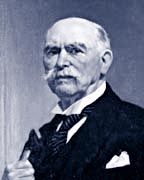 Douglas Hyde Dr Douglas Hyde was a scholar and Ireland's first President. He was born 17th January 1860, at Portahard, between Frenchpark and Ballaghderreen, nr. Castlerea, County Roscommon. A permanent exhibition on his life and work is housed in the former Church of Ireland church at Portahard, where his father, Rev. Arthur Hyde, was once rector. While a young man he became fascinated with hearing the old people in the locality speak the Irish language, a language looked down on at the time by many and seen as "backward" and "old fashioned". Rejecting family pressure that like past generations of Hydes he follow a career in the Church, Hyde instead became an academic. His passion for Irish, already a language in severe decline, led him to found the Gaelic League, or in Irish, Conradh na nGaeilge, in the hope of saving it from extinction. Hyde's Irish language movement, initially seen as eccentric, gained a mass following throughout the island. He published a pamphlet called The Necessity for De-Anglicising Ireland, arguing that Ireland should follow his own traditions in language, literature and even in dress.  Douglas Hyde (Hyde began wearing knee-length breeches rather than trousers, in the mistaken belief that they were a traditional Irish outfit.) Many of the new generation of Irish leaders who played a central role in the fight for Irish independence in the early twentieth century, including Patrick Pearse, Eamon de Valera (who married his Irish teacher Sinead Flanagan), Michael Collins, and Ernest Blythe first became politicised and passionate about Irish independence through their involvement in Conradh na nGaeilge. Hyde himself however felt uncomfortable at the growing politicisation of his movement and resigned the presidency in 1915. 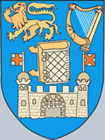 Trinity College Crest Educated at Trinity College Dublin he won prizes for English verse and prose. To his command of Latin, Greek and Hebrew he added fluency in French, German, and Irish. In 1891 he went to Canada for a year as interim professor of modern languages in the University of New Brunswick. Returning to Ireland, he settled at Ratra Park in Roscommon and devoted himself to literary pursuits and the revival of Irish, which he had learned from the old people in the countryside around his father's rectory, and he collected folklore and poetry from them. Beside the Fire (1889) was his first collection of folk-tales. Love Songs of Connacht followed in 1893 with his own verse translations. That year saw the foundation of the Gaelic League, with Hyde as moving spirit and first president. The league flourished and by 1905 had 550 branches, which organised lessons in Irish and encouraged Irish dances and games. 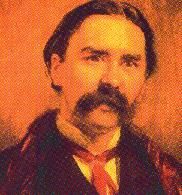 Douglas Hyde He went to America in 1905 on a successful fund-raising tour and on his return was made a freeman of Dublin, Cork, and Kilkenny. The Gaelic League took a dominant part in the successful agitation to make Irish an essential subject for entrance to the National University of Ireland, founded in 1908. By this time it had become a vital force in the movement for national revival. Hyde became the first professor of Modern Irish in UCD in 1909 and held the chair until his retirement in 1932. He was a Free State senator 1925-26. He had always insisted that the Gaelic League remain a non-political organisation, but its very success in reviving the national spirit helped to inspire the separatist movement, and it became clear that the language and the political struggle could not be kept apart. 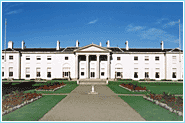 President's House - Áras an Uachtaráin Hyde resigned the presidency in 1915 and, avoiding political activity, confined himself to academic pursuits. Characteristically, he showed no animosity towards his successors. When the office of President of Ireland was created under the Constitution of 1937, Hyde was unanimously selected by all parties and held office until his term expired in 1945. He died in Dublin, 12 July 1949. His wife, whom he married in 1893, predeceased him in 1939. They had two daughters. 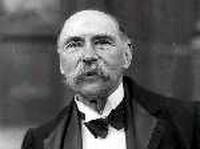 Douglas Hyde Hyde's verse translations from the Irish have appeared in many anthologies. He adopted the pen-name An Craoibhín Aoibhinn, 'the delightful little branch'. His folk-tales kindled the imagination of Yeats, Lady Gregory, and others prominent in the literary revival. The IAL awarded him the Gregory Medal in 1937. His other publications include Religious Songs of Connacht (1906), A Literary History of Ireland (1899), and some one-act plays. His play Casadh an tSúgáin, produced by the Irish Literary Theatre in October 1901, was the first play in Irish to appear on a professional stage. Sourced from A Dictionary of Irish Biography, Henry Boylan (ed.), Gill & Macmillan, Dublin, 1998. |
